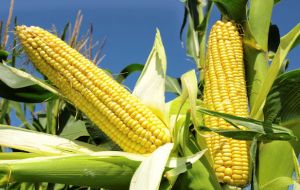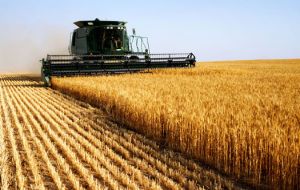MercoPress. South Atlantic News Agency
Large inventories and sluggish demand for 2016/17 global cereal production predicts FAO
 Maize output is seen growing by 1.1% to 1.014 million tons, driven by recovering yields in the European Union and expanding plantings in the United States
Maize output is seen growing by 1.1% to 1.014 million tons, driven by recovering yields in the European Union and expanding plantings in the United States  World rice production is predicted to recover with a return to normal weather conditions in Asia, where erratic rains have affected planting activity for the
World rice production is predicted to recover with a return to normal weather conditions in Asia, where erratic rains have affected planting activity for the  The small decline in 2016/17 world cereal production portended by FAO would largely result from a lower worldwide wheat production
The small decline in 2016/17 world cereal production portended by FAO would largely result from a lower worldwide wheat production World cereal production in 2016 is set to amount to 2 521 million tons, just 0.2% off last year's large output and the third-highest global performance on record, according to FAO's first forecast for the new season, released on Thursday. Large inventory levels and relatively sluggish global demand mean that market conditions for staple food grains appear stable for at least another season, the agency's latest Cereal Supply and Demand Brief predicts.
The small decline in 2016/17 world cereal production portended by FAO would largely result from a lower worldwide wheat production, which is now expected to amount to 712.7 million tons, some 20 million tons less than in 2015. The decline mostly reflects smaller plantings in the Russian Federation and Ukraine, both affected by dry weather.
Global output of coarse grains is projected at 1.313 million tons, up about 11 million tons from 2015, with expected increases in maize production more than offsetting declines for barley and sorghum.
Maize output is seen growing by 1.1% to 1.014 million tons, driven by recovering yields in the European Union and expanding plantings in the United States. At the same time, maize production is expected to fall in Southern Africa and Brazil, due to drought and adverse growing conditions associated with El Niño.
World rice production is predicted to recover with a return to normal weather conditions in northern-hemisphere Asia, where erratic rains have affected planting activity for the past two seasons. Global output, although impacted by unattractive prices, is predicted to rise 1.0% to 495 million tons.
International trade in cereals in 2016/17, however, is poised to decline for the second consecutive season - by 1.4% to 365 million tons - due to ample stockpiles and modest demand growth in many importing countries.
Global cereal utilization in 2016/17 is foreseen to grow only modestly, rising by around 1.0% to 2 547 million tons, according to very preliminary new estimates.
As utilization is anticipated to exceed production, cereal reserves would need to be drawn down to fill the gap. FAO's first forecast for world cereal stocks at the close of seasons ending in 2017 points to a likely 3.9% annual decline to 611 million tons. However, the resulting world cereal stock-to-utilization ratio would still approach 23%, well above the historical low of 20.5% registered in the 2007/2008 season.




Top Comments
Disclaimer & comment rulesCommenting for this story is now closed.
If you have a Facebook account, become a fan and comment on our Facebook Page!